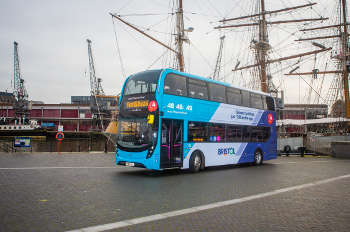The West of England Combined Authority (WECA) has begun work on a programme to improve smart ticketing on public transport across the region but a fully integrated Oyster-style system appears to be years away.
A paper last month to the WECA Committee and the wider West of England Joint Committee includes a stark assessment of the difficulties in developing fully integrated bus, light and heavy rail ticketing.
The combined authority said significant progress has already been made in the region, including the availability of mobile phone apps and the Travelwest travelcard.
As the first phase of a four-phase programme, it is now providing £418,000 to help smaller bus operators replace old equipment with contactless bank card payment technology, while non-WECA member North Somerset Council is providing £40,000 to operators in its area.
WECA has also approved £300,000 in Phase 1 of the programme to develop further options.
West of England mayor Tim Bowles (pictured), said: ‘Simplifying ticketing could mean, for example, that a resident in Keynsham uses the same ticket to take the train into Bristol and then a metrobus towards Cribbs Causeway.’
He added: ‘We will work with partners to look at the best ways of improving ticketing, which will give residents more options for how they travel.’
The authority hopes to provide a single mobile app and smart ticket offer under Phase 2 of the programme, from 2020 to 2021, alongside pay as you go (PAYG) ‘simple capping’ within a single bus operator.
Phase 3 includes ‘PAYG simple capping’ for rail, and multi-operator ‘complex capping’ on buses. Phase 4 is to include multi-modal capping and pre-purchase/account-based ticketing for all modes.
Neither Phase 3 nor Phase 4 have timings - these are ‘dependent upon agreements that would need to be reached with bus and rail operators and are therefore harder to predict'.
The paper also describes developments that are happening ‘at pace’ across the country, through smart phone and contactless payment, but describes the difficulties attached to these.

There are no plans to extend smart ticketing to old ships
For example, while the UK’s major bus operators have committed to enabling contactless payments on all buses by 2022 ‘there remain questions about the payment models and technology that this would involve’.
In addition, while Transport for the North (TfN), supported by the Department for Transport ‘are positioned in a lead role to deliver a fully integrated bus, light and heavy rail ticketing system across their region…the scale of the projects is considerable, creating a range of implementation challenges’.
Other bodies such as the Welsh Government and Midlands Connect are also aiming to create integrated ticketing systems which could offer ‘lighter’ alternatives to the TfN approach, the paper notes.
The paper also notes that mobile ticketing is normally restricted to one operator ‘and few advances have been made in integrating different operators’.
Attempts to define common standards for data, protocols and hardware in addition to ITSO ‘are still at a very early stage’.
Register now for full access
Register just once to get unrestricted, real-time coverage of the issues and challenges facing UK transport and highways engineers.
Full website content includes the latest news, exclusive commentary from leading industry figures and detailed topical analysis of the highways, transportation, environment and place-shaping sectors.
Use the link below to register your details for full, free access.
Already a registered? Login